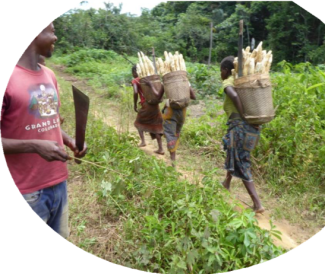For sustainable and scalable Community Forests in the Democratic Republic of Congo
Entrusting the management of tropical forests to the people who live in and depend on them is the fairest and most effective means of protecting them. However, until recently, communities in the Democratic Republic of Congo (DRC) had no possibility of securing legal rights to their rainforest home. Building on the passage of landmark community forest legislation, this project aims to lay the foundations for community-based forest management in DRC, by empowering local and indigenous communities to secure their rights and thrive through sustainable livelihoods. We will do this by piloting innovative livelihoods, supporting traditional and inclusive governance of forests, and strengthening the institutions, policies, and know-how necessary to mainstream this approach.
OBJECTIVE AND APPROACH
Our vision for this project is for: “Community forests to drive improved livelihoods and wellbeing in forest communities, as well as biodiversity protection and reduced deforestation in target areas in DRC, providing a scalable model by 2025 for nationwide implementation.”
We aim to achieve this goal by:
- Improving communities’ livelihoods – Piloting sustainable and equitable livelihoods including for women, Indigenous Peoples, and other marginalized groups.
- Developing a self-reliant economy – Enlisting support from the private sector to develop sustainable and scalable economic opportunities, which secure fair commercial partnerships and responsible long-term investments, and ensure the viability of community enterprises.
- Improving governance and forest management – Embedding these income-generating activities in accountable and inclusive community governance and land use plans to ensure environmental sustainability and equal distribution of benefits.
- Securing customary rights – Supporting more communities to obtain and manage community forests.
- Preventing deforestation and preserving biodiversity – Combating illegal logging and poaching through community-led forest monitoring, embedding forest protection in land use plans, and promoting scalable agroforestry techniques.
- Enhancing the policy and legal framework - Promoting lesson learning and consensus building around a rights-based, participatory, and cross-sectoral vision of community forests through a national roundtable process.
- Enabling a supportive institutional environment – Building civil society and forest administration’s capacity to oversee and support the allocation and management of community forests.
KEY EXPECTED RESULTS (R)
R1. Community forests prove to be a scalable model to improve local communities’ wellbeing in DRC
R2. Community forests contribute to reduce deforestation and protect biodiversity
R3. The national legal and policy framework supports community forests according to the central principles of the National Strategy (community rights, inclusion, customary governance, decentralization, and capacity building)
R4. An enabling institutional environment sustained in adequate capacity is in place to effectively implement this model of community forests
TARGET BENEFICIARIES
Upwards of 100,000 direct beneficiaries in 20 communities in:
- Lukolela and Ingende territories, Equateur province,
- Lubero territory, North Kivu province,
- Kailo territory, Maniema province.
- Beneficiaries include Indigenous Peoples, notably the Batwa in Equateur and the Wambuti in Nord Kivu.
KEY ACCOMPLISHMENTS
- Three communities have acquired titles for their forest concessions (Bofekalasumba and Inganda in the Equateur province and Bamasobha in North Kivu), securing 31,450 hectares for 7,500 people in 13 villages; bringing the total to 9 communities supported who have their titles,
- Three new applications of community forest concessions (CFC) submitted by the supported communities to the local authorities in the Maniema province,
- Finalization of socio-economic and biodiversity data collection, in Equateur to establish the baseline on community livelihoods and biodiversity,
- Producing the deforestation baseline for current CFC and control sites,
- Holding the 2021 Multi-Stakeholder RoundTable on Community Forestry, a consensus was achieved on the strategic direction of the process and the immediate priorities actions, and
- Continued support to the improvements of the Community Forest database.
PROJECT DETAILS
Period: September 30, 2020 - September 29, 2025
Prime Partner: Rainforest Foundation UK (RFUK)
Implementing partners:
GASHE: Action Group to Save Man and his Environment (Equateur)
RCREF: Network for the conservation and rehabilitation of forest ecosystems (North-Kivu)
PREPPYG: Peasant association for the rehabilitation and protection of pygmies (North-Kivu)
GeoFirst: GeoFirst Development (Maniema and Kinshasa)
CAGDFT: Support Center for the Sustainable Management of Tropical Forests (Kinshasa)
APEM: Action for the promotion and protection of threatened peoples and species (Kinshasa)
ASSECCAF: Association of cocoa and coffee exporters from the DRC (Equateur and Kinshasa
CONTACTS
Christian Kalinde, Program Management Specialist (Climate Change), CARPE, ckalinde@usaid.gov
Melody McNeil, Director, CARPE, mmcneil@usaid.gov
Georges-Thierry Handja, Chief of Party, RFUK, GeorgesThierry@rainforestuk.org

